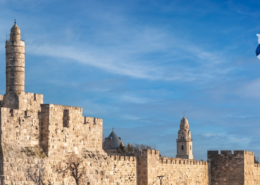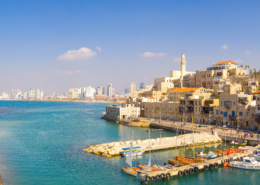The Feast of Tabernacles, which is called Sukkot in Hebrew, is a festival of joy. It celebrates the goodness of God’s protection; both in the wilderness, and through the trials and tribulations of life. As believers, we join in the celebration of God’s provision, because how much more is our joy complete, now that we are assured of our salvation through Jesus’ atonement for our sin!
How apt then, that the last of the Jewish festivals which arrive in quick succession, known as the High Holidays, takes us from earnest reflection upon the cost of atonement, to the joy of its provision.
One of the ways this festival is celebrated by Jewish people, includes the gathering of those from every generation to build sukkot (Hebrew for booths). The roof of each booth must be constructed so that those inside can see the stars above, and remember the everlasting nature of God and His promises.
It is also custom to assemble bundles of greenery with which to decorate the sukkot. These consist of palm, willow, and myrtle, which is called a lulav, along with a citron-like fruit called an etrog (Leviticus 23:40).
Sukkot is a season of hospitality, fellowship, and goodwill in community. Not only do families gather to dine and fellowship in their sukkah booth, but they invite others, and visit others. Sharing festive meals in this intimate and humble environment, creates a sense of union and connection. This is uplifting and comforting for all those who partake.
There is also singing and dancing as the everlasting and faithful nature of God is celebrated, and for believers in Messiah, everlasting salvation in Jesus gives cause for rejoicing. These festivities call to mind traditional Christmas celebrations for those of us in the UK. The joy of these is summed up in the lyrics of a yearly festive chart topper: “Oh I wish it could be Christmas everyday”.
And that is the point, Sukkot shows us that it can indeed be (like) Christmas every day because the simplicity of the booth, the cost effective décor of locally gathered greenery, and the exchange of good company and kindness in place of material gifts, allows us to extend our invitation (given and accepted), to a much larger and varied group of people.
When we look to the ministry of Jesus, we see the themes of Sukkot as a way of life. Our Lord regularly fellowshipped with people from every community, dining with them and sharing the truth, glory and grace of God’s kingdom. Indeed, in His parables, Jesus describes the Kingdom of God as a wedding feast thrown by the great King and Master.
The Kingdom is here! We are able to follow in the way of our Master, laying down the seeking and persevering of money, to instead live in a community oriented way. This will enable us to demonstrate the Kingdom in “word and deed” (Colossians 3:17). People will see our kindness and generosity in sharing our food and time. They will experience the love that has freed us to be willing to share, to listen and offer encouragement and hope, to people outside of our immediate circle of friends and family.





